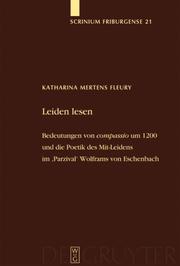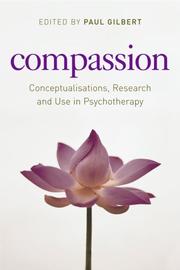| Listing 1 - 3 of 3 |
Sort by
|

ISBN: 9783110191561 3110191563 9786612195518 1282195514 3110201801 9783110201802 9781282195516 6612195517 Year: 2006 Volume: 21 Publisher: Berlin ; New York Walter de Gruyter
Abstract | Keywords | Export | Availability | Bookmark
 Loading...
Loading...Choose an application
- Reference Manager
- EndNote
- RefWorks (Direct export to RefWorks)
Die interdisziplinär angelegte Studie belegt, historische Konzepte rekonstruierend, dass der zu Beginn des 13. Jahrhunderts entstandene ,Parzival' Wolframs von Eschenbach Konzepte von compassio adaptiert und integriert. Zur Klärung des Begriffs dienen Sondierungen in der lateinischen geistlichen Literatur. Dieser zufolge bedeutet compassio um 1200 eine praktisch-ethische bzw. affektive Partizipation und Angleichung an das Leiden des Nächsten bzw. an Christi Passion und bildet dadurch auch einen Verstehensakt, eine Hermeneutik des Leidens. Vergleichbare Konzepte sind zu gleicher Zeit am Hof Hermanns I. von Thüringen (1190-1217) präsent, dem damaligen Zentrum volkssprachiger Literaturproduktion. Sie lassen sich dort vornehmlich aus den Miniaturen des zu Beginn des 13. Jahrhunderts angefertigten ,Elisabethpsalters' erschließen. Vor dem Hintergrund obiger Ergebnisse gewinnt die literaturwissenschaftliche Analyse des Romans an Profil. Compassio bildet im Parzivalteil ein handlungskonstituierendes Element und wird dort, die Handlung spiegelnd, sogar vom Erzähler in Kommentaren und Publikumsanreden aufgegriffen. Die Arbeit wurde mit dem "Zeno Karl Schindler-Preis für Literaturwissenschaft 2006" ausgezeichnet.
Wolfram von Eschenbach --- Compassion in literature. --- Literature. --- Wolfram, von Eschenbach, active 12th century. Parzival. --- Compassion in literature --- Languages & Literatures --- Germanic Literature --- Compassion (Buddhism) in literature --- Wolfram, --- Elisabeth (Thuringia, landgravess), emotion/in literature, compassion/in literature, Middle Ages/literature, Parzival.
Book
ISBN: 3031449231 Year: 2024 Publisher: Cham : Springer Nature Switzerland : Imprint: Palgrave Macmillan,
Abstract | Keywords | Export | Availability | Bookmark
 Loading...
Loading...Choose an application
- Reference Manager
- EndNote
- RefWorks (Direct export to RefWorks)
This book explores a heretofore unremarked linkage between Bernard Shaw, the twentieth-century French thinker Paul Ricoeur, and Jesus of Nazareth. The ties that bind them are a foundational interest in the social teachings of the Nazarene and their use of a shared dialectics with respect to living the kind of compassionate life that holds out the promise in our contemporary world of achieving something approximating universal wellness on a healthy planet at peace with itself. This work argues that the three principal subjects of the study—independently of one another—used the same dialectical method to reach the same dialectically derived conclusion about how humans can live redemptively in a fractured world. Howard Ira Einsohn was a part-time instructor at Middlesex Community College and Wesleyan University’s Institute of Lifelong Learning for a combined total of 15 years (2004-2019), most of which were spent at the former institution. During this period, he taught courses in writing, advanced writing, technical writing, literature surveys, drama and the short story, as well as courses on Ibsen, Flannery O’Connor, and Tim O’Brien.
Compassion. --- Compassion in literature. --- Jesus Christ. --- Theater --- Religion --- Literature --- Theatre History. --- Philosophy of Religion. --- Literary Theory. --- History. --- Philosophy.

ISBN: 158391983X 1583919821 9781583919828 9781583919835 9786610109456 0203642228 1280109459 0203003454 1135877890 1135443742 1135443750 0415970512 020387109X 1280052805 9004493352 9042009039 Year: 2004 Publisher: London : Routledge,
Abstract | Keywords | Export | Availability | Bookmark
 Loading...
Loading...Choose an application
- Reference Manager
- EndNote
- RefWorks (Direct export to RefWorks)
In Compassion, ten scholars draw on literature, psychoanalysis, and social history to provide an archive of cases and genealogies of compassion
Psychothérapie --- Compassion --- Relations psychothérapeute-patient --- Psychotherapy --- Psychotherapist and patient --- 615.851 --- Psychagogy --- Therapy (Psychotherapy) --- Mental illness --- Clinical sociology --- Mental health counseling --- Patient and psychotherapist --- Psychoanalyst and patient --- Patients --- Emotions --- Psychotherapie. Pschychoanalyse als therapie --- Treatment --- Compassion. --- Compassion in literature. --- Compassion in literature --- Ethics --- Psychology --- Philosophy --- Social Sciences --- Philosophy & Religion --- Compassion (Buddhism) in literature
| Listing 1 - 3 of 3 |
Sort by
|

 Search
Search Feedback
Feedback About UniCat
About UniCat  Help
Help News
News